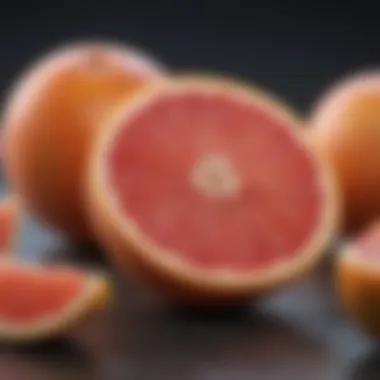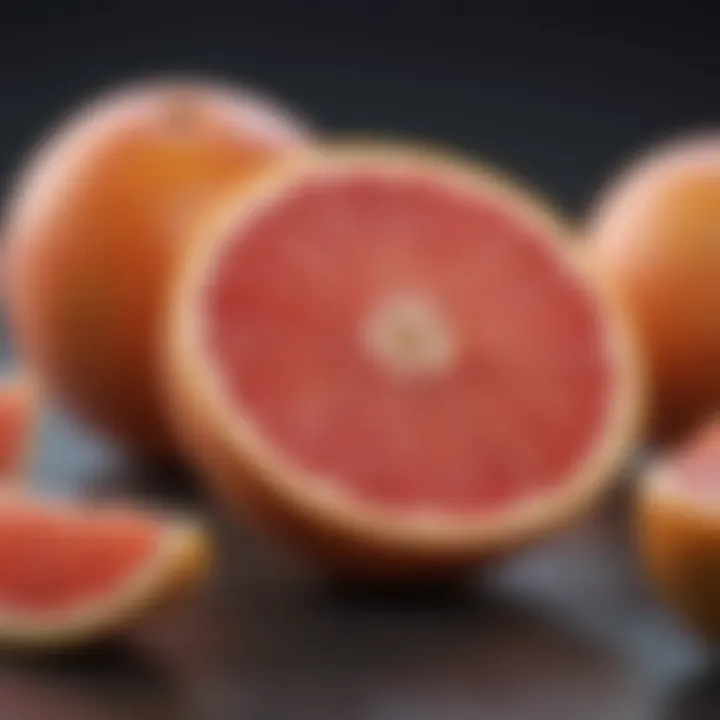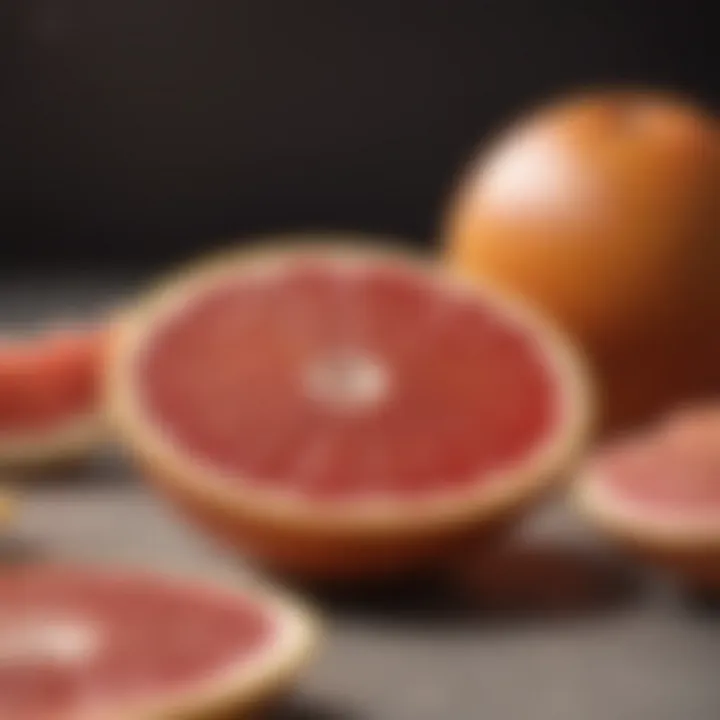Grapefruit and Eliquis: Risks and Recommendations


Intro
Grapefruit is well known for its vibrant taste and culinary versatility, but it is also recognized for its complex interactions with various medications. One such medication is Eliquis, an anticoagulant that helps prevent blood clotting. Understanding the implications of combining grapefruit with Eliquis is crucial for patients looking to manage their health effectively. This investigation will delve into the interactions between these two elements, emphasizing the need for awareness among those undergoing treatment with Eliquis.
The consumption of grapefruit while taking Eliquis can lead to significant effects on drug metabolism. Grapefruit contains compounds known as furanocoumarins, which can inhibit the enzyme CYP3A4 in the liver and intestines. This enzyme is responsible for breaking down many medications, including Eliquis. As a result, grapefruit may alter the effectiveness and safety of the drug. Some patients may find their blood-thinning effects enhanced, which could lead to an increased risk of bleeding, while others may experience reduced efficacy of Eliquis, raising concerns about clotting.
In this article, we will examine the implications of consuming grapefruit while on Eliquis. We will present crucial insights regarding risks and benefits, and offer practical dietary advice for those on this anticoagulant therapy. An understanding of these interactions can foster better choices, ultimately enhancing health outcomes of individuals engaging with these substances.
Preamble to Eliquis and Grapefruit
Understanding the interplay between Eliquis and grapefruit consumption is crucial for patients undergoing treatment with this anticoagulant. Eliquis, known scientifically as apixaban, is prescribed to prevent strokes and blood clots in certain conditions like atrial fibrillation. While grapefruit is a popular fruit, its effects on drug metabolism require careful consideration. This section delves into the fundamental aspects of Eliquis and the nutritional profile of grapefruit, providing insight into their characteristics and implications for users.
Understanding Eliquis
Mechanism of Action
Eliquis operates as a direct factor Xa inhibitor. This mechanism disrupts the coagulation cascade, effectively reducing the ability of blood to clot. This characteristic is particularly beneficial for individuals at risk of thromboembolic events. The direct action on factor Xa differentiates Eliquis from other anticoagulants, providing a targeted approach. However, this mechanism also suggests a potential for interaction with certain foods, notably grapefruit, which makes this discussion relevant.
Common Uses
The primary uses of Eliquis include stroke prevention in individuals with atrial fibrillation and treatment for deep vein thrombosis or pulmonary embolism. Its popularity among anticoagulants stems from its effectiveness and favorable pharmacokinetic profile. Many patients prefer Eliquis due to its less frequent dosing requirements and lower risk of significant dietary restrictions compared to other anticoagulants. However, awareness regarding grapefruit is vital due to its potential to impact the drug's effectiveness.
Patient Considerations
When prescribing Eliquis, healthcare providers must consider various factors including renal function, weight, and potential interactions with other medications. Patient education is critical; understanding the implications of grapefruit consumption can promote adherence to treatment plans. Patients must be aware that while Eliquis is essential for managing their condition, dietary choices can significantly affect drug efficacy and safety, particularly with grapefruit.
Nutritional Profile of Grapefruit
Vitamins and Nutrients
Grapefruit is rich in vitamins C and A, along with various antioxidants. These vitamins contribute to overall health and can support immune function. The fruit also provides potassium, which is important for maintaining normal blood pressure levels. While these nutrients offer health benefits, their interaction with medicines such as Eliquis cannot be overlooked, making it a significant area for discussion.
Health Benefits
The health benefits of grapefruit extend beyond its nutritional content. Regular consumption may aid in weight management and improve cardiovascular health. Some studies suggest that grapefruit can enhance the metabolism of other drugs due to its effects on liver enzymes. However, this interaction with liver enzymes raises concerns for those on medications like Eliquis, which can lead to unintended consequences if consumed in large quantities.
Risks of Overconsumption
Overconsumption of grapefruit presents notable risks, particularly for individuals taking medications. Excessive intake may lead to increased blood levels of drugs metabolized by the liver, such as Eliquis. This can result in heightened side effects and complications. Understanding these risks allows patients to make informed choices about their diet while adhering to prescribed therapies. It is crucial to communicate these risks clearly to those under treatment.
Pharmacokinetics: How Eliquis Works
Understanding the pharmacokinetics of Eliquis is crucial for comprehending how this anticoagulant functions in the body. This section elaborates on key processes such as absorption, distribution, metabolism, and elimination, and their relevance when taking Eliquis alongside foods like grapefruit. A clear grasp of these processes helps patients make informed decisions about dietary choices while on medication, potentially minimizing risks.
Absorption and Distribution


Eliquis, or apixaban, is administered orally and undergoes absorption in the gastrointestinal tract. The bioavailability of Eliquis is around 50%. This means when taken, only around half of the active substance effectively enters the bloodstream. Factors such as age, weight, and existing medical conditions may influence absorption rates. After absorption, Eliquis undergoes distribution in the body.
Once in the bloodstream, apixaban binds to plasma proteins such as albumin, which influences how much of the drug is available to exert its anticoagulant effects. The volume of distribution is roughly 21 liters. Higher lean body weight can enhance distribution, increasing effectiveness. It's important to recognize that any food may slightly alter absorption profile, even though grapefruit-specific interactions are more prominent during metabolism.
Metabolism and Elimination
Eliquis is primarily metabolized in the liver. The liver enzymes, especially the cytochrome P450 system, are essential for breaking down the drug. Apixaban’s main metabolic pathway involves the CYP3A4 enzyme, along with other minor pathways. This is precisely where grapefruit can have an interaction. Grapefruit juice can inhibit the CYP3A4 enzyme, leading to increased levels of Eliquis in the bloodstream. This increase may heighten the risk of bleeding and other side effects, which emphasizes the importance of managing grapefruit intake while on this medication.
The drug is eliminated through both renal and fecal routes. Roughly 27% is excreted in the urine and about 23% in feces. The half-life of Eliquis is about 12 hours, which indicates how long the drug stays active in the body. Monitoring kidney function is critical, as impaired renal function can lead to higher drug levels and increase risks.
In summary, the processes of absorption, distribution, metabolism, and elimination encapsulate the pharmacokinetic behavior of Eliquis. Understanding these mechanisms is vital for patients to ensure effective management of their anticoagulation treatment, particularly when integrating other dietary factors like grapefruit.
Impact of Grapefruit on Drug Metabolism
Understanding how grapefruit affects drug metabolism is crucial for patients on Eliquis. Eliquis is an anticoagulant medication that requires careful monitoring due to its potential interactions with various foods and substances. Grapefruit is particularly noteworthy because it can significantly alter the effectiveness and safety of medications. This section will delve into how grapefruit juice interacts with the cytochrome P450 system, which is vital for drug metabolism.
Grapefruit Juice and Cytochrome P450
Grapefruit juice has long been known to influence enzymes within the cytochrome P450 family, particularly CYP3A4. This enzyme plays a pivotal role in the metabolic processing of numerous medications, including Eliquis. The compounds in grapefruit inhibit this enzyme, which can lead to decreased metabolism of drugs processed by CYP3A4. Consequently, if patients consume grapefruit or its juice while taking Eliquis, the levels of the drug in their system can rise. This situation necessitates caution, as elevated drug levels may lead to an increased risk of adverse effects or complications.
Potential Interference with Eliquis Metabolism
This subsections explores the potential interference that grapefruit can have on Eliquis metabolism, highlighting two critical concerns: increased blood levels of the drug and possible side effects.
Increased Blood Levels
When grapefruit juice is consumed, it can lead to increased blood levels of Eliquis. This is due to the inhibition of CYP3A4, which affects how the body processes the drug. Elevated levels of Eliquis can enhance its anticoagulant effects, which might sound beneficial but can lead to serious complications like excessive bleeding or hematoma. Therefore, it is essential to understand that while the heightened drug concentration can increase efficacy, it also significantly raises the risk for adverse events, making this topic vital for ensuring patient safety and optimal management of anticoagulant therapy.
Possible Side Effects
Alongside the increased blood levels, another aspect to consider is the possible side effects that may occur due to grapefruit consumption while on Eliquis. These side effects can range from mild to severe and may include symptoms like bruising, prolonged bleeding, or other unexpected reactions. The key takeaway is that the interaction can alter how patients experience treatment with Eliquis, making it crucial for patients to be mindful of their dietary choices. Knowing that grapefruit can lead to potentially harmful side effects underlines the importance of consulting healthcare professionals when it comes to dietary modifications for patients on anticoagulants.
Clinical Research on Grapefruit and Eliquis
Clinical research focusing on the interaction between grapefruit and Eliquis is essential for understanding the complexities of medication management. Eliquis, or apixaban, is an anticogulant widely used for preventing blood clots. Its efficacy can be influenced by various factors, including dietary choices. Grapefruit has long been known to affect drug metabolism, primarily due to its interaction with the cytochrome P450 enzyme system.
This section provides a thorough examination of studies that analyze how grapefruit consumption impacts the effectiveness of Eliquis. Such insights are critical for patients and healthcare providers. They help inform dietary guidelines and promote safer medication practices.
Additionally, the consideration of clinical research demonstrates the need for ongoing investigation. This ensures patient safety and drug efficacy remain paramount. As the landscape of medication interaction becomes increasingly intricate, embracing these findings is essential.
Studies on Drug Interactions
Research in this area often highlights the effects of grapefruit on various drugs, including Eliquis. A notable aspect of these studies is the focus on how grapefruit juice inhibits the CYP3A4 enzyme. This enzyme plays a key role in the metabolism of many medications. When grapefruit juice is consumed, it can lead to increased blood concentrations of drugs processed by CYP3A4.
For Eliquis, this means potential alterations in its expected therapeutic effect. Studies have shown mixed outcomes: some indicate that grapefruit may not significantly change the metabolism of Eliquis, while others suggest caution. For instance, a study published in the Journal of Clinical Pharmacology reported that patients who consumed grapefruit juice had altered Eliquis levels in their bloodstream.


It is important to note that the quantity of grapefruit consumed may affect the degree of interaction.
Findings and Recommendations
Research findings suggest a careful approach regarding grapefruit consumption while taking Eliquis. Here are some key takeaways:
- Limited Interaction: Some studies indicate limited interaction between grapefruit and Eliquis, but individual responses may vary.
- Cautious Consumption: Patients are often advised to limit or avoid grapefruit products to minimize any potential risks.
- Regular Monitoring: Regular blood tests may help to monitor drug effectiveness and detect any unexpected interactions due to grapefruit intake.
- Communication with Healthcare Providers: Engaging in discussions with doctors or pharmacists about dietary choices is crucial. These professionals can provide personalized advice based on individual health scenarios.
Guidelines for Patients Taking Eliquis
Understanding the dietary guidelines for patients taking Eliquis is essential. Patients must recognize how certain foods can affect their medication efficacy. Grapefruit, in particular, deserves careful attention. Adhering to proper dietary restrictions leads to safer medication management, fewer side effects, and better health outcomes. This section delves into the specific dietary recommendations and the foods that can be safely incorporated into a diet while on Eliquis.
Dietary Restrictions
Patients on Eliquis must navigate various dietary restrictions to avoid adverse interactions. One significant concern is grapefruit. Consuming grapefruit juice can alter the metabolism of Eliquis, potentially leading to increased drug levels in the blood. The consequences of this can be severe, including a heightened risk of bleeding.
Moreover, other foods and substances should also be approached with caution. For instance, the intake of certain herbal supplements, particularly those containing ginkgo biloba or St. John's Wort, may interfere with the drug's action. It is vital to inform a healthcare professional about any additional supplements or dietary changes.
It is not just grapefruit but also other citrus fruits that can interact with medications. For instance, Seville oranges and pomelos can have similar effects. To mitigate risks, patients should:
- Avoid grapefruit and certain citrus fruits.
- Discuss any new medications or health supplements with a healthcare provider.
- Monitor blood levels of Eliquis to assess medication effectiveness and safety.
Safe Foods to Incorporate
Despite the dietary restrictions, there are many safe and nutritious foods that patients can enjoy while on Eliquis. A balanced diet can improve overall health and support the treatment. Here are some foods that can be safely incorporated:
- Leafy Greens: Spinach, kale, and collard greens are rich in vitamins and can help keep the body functioning well.
- Whole Grains: Foods such as brown rice, quinoa, and oats provide essential nutrients and energy without interfering much with medication.
- High-Quality Proteins: Options like chicken, turkey, and legumes support health without risking drug interactions.
- Fruits (Other than Grapefruit): Apples, berries, and bananas provide necessary vitamins and fiber.
- Vegetables: Variety like carrots, broccoli, and bell peppers contribute to a healthy diet while avoiding problematic fruits.
Incorporating these foods can lead to better health while respecting the guidelines of Eliquis treatment. A well-rounded diet not only supports overall well-being but also minimizes potential hazards.
"Always speak to your healthcare provider before making significant changes to your diet or medication regimen."
Staying informed about what foods to avoid and which foods to embrace ensures that patients can maintain an optimal course of treatment without undue complications.
Consulting Healthcare Professionals
When it comes to managing health, especially while taking medications like Eliquis, consulting healthcare professionals is vital. These experts can provide individualized guidance tailored specifically to your health conditions and medication. Relying on professional advice ensures that you are well-informed about interactions that may affect the effectiveness of your treatment or pose risks to your well-being.
Importance of Medical Guidance
Medical guidance plays a critical role for patients taking Eliquis. Eliquis, being an anticoagulant, requires careful monitoring to avoid complications related to bleeding or thromboembolism. Grapefruit is known to affect how some drugs are metabolized, which may impact the concentration of Eliquis in your bloodstream. For that reason, understanding how grapefruit consumption might alter the drug's effects is essential.
Healthcare providers can:
- Assess your overall health and any other medications you may be taking.
- Advise on dietary choices that complement your treatment plan.
- Help manage any potential side effects or interactions that could arise from grapefruit consumption.


A tailored approach protects against unforeseen complications and enhances the overall effectiveness of your treatment.
Questions to Ask Your Doctor
Engaging in a dialogue with your healthcare provider is crucial. Asking the right questions can clarify any concerns you have regarding grapefruit consumption while on Eliquis. Here are some pertinent questions to consider:
- Is it safe for me to consume grapefruit while on Eliquis?
Understanding the specific interaction between your medication and grapefruit can help you make informed choices. - What dietary changes should I consider?
Your provider can suggest alternatives to grapefruit that still align with a healthy diet. - Are there other foods or drinks I should avoid?
There may be other substances that could have similar effects as grapefruit, so getting guidance on those is beneficial. - What should I do if I accidentally consume grapefruit?
Knowing how to respond after consuming grapefruit can help you manage any complications that might arise.
Consulting your healthcare provider about any such inquiries not only shows diligence in your health management but also fosters a collaborative relationship for better treatment outcomes.
Managing Risks While on Eliquis
Understanding the significance of managing risks associated with Eliquis consumption is crucial for anyone undergoing treatment with this anticoagulant. The drug's effectiveness hinges not only on the dosage but also on the individual's lifestyle choices, including dietary habits. Grapefruit, with its potential interactions, raises concerns that warrant attention when combined with Eliquis. By managing risks, patients can enhance the medication's effectiveness while minimizing potential adverse effects.
Monitoring Medication Effectiveness
Monitoring the effectiveness of Eliquis is an essential step for patients. Regular check-ups and blood tests help assess how well the drug is working in preventing blood clots. It's vital to maintain awareness of how other factors might influence this effectiveness, especially dietary components like grapefruit. Consuming grapefruit can alter the metabolism of Eliquis, leading to increased blood levels. Patients should keep track of their experiences with the medication—any changes in symptoms should be reported to healthcare providers promptly.
Clinical professionals usually advise keeping a medication diary. This can include notes on any grapefruit consumption, changes in diet, and how the patient feels on the medication. This information aids in adjusting the treatment plan tailored to an individual's needs.
Identifying Signs of Interaction
Identifying signs of interaction between grapefruit and Eliquis is vital for the safety of patients. While consuming grapefruit, individuals should watch out for symptoms that indicate excessive anticoagulation. Some warning signs can include unusual bruising, prolonged bleeding from cuts, or blood in urine or stool. These symptoms could suggest that Eliquis levels are too high in the body due to grapefruit's effects on drug metabolism.
"It's important for patients to educate themselves about potential interactions and be proactive in their health management."
Patients should consult healthcare professionals when these signs arise. It is always better to err on the side of caution and discuss any concerns regarding diet and medications. Educating oneself about the implications of dietary choices while on anticoagulants like Eliquis is a fundamental step in ensuring safety and treatment adherence.
In summary, effective management of risks while on Eliquis involves continuous monitoring and timely identification of interactions, particularly with grapefruit. Through diligence and communication with healthcare providers, patients can navigate their treatment journey more safely.
Culminations and Final Thoughts
The significance of understanding grapefruit consumption while taking Eliquis cannot be understated. As a widely used anticoagulant, Eliquis serves an essential role in preventing blood clots. However, dietary choices, particularly the consumption of grapefruit, can greatly affect the drug’s effectiveness and safety. Grapefruit juice has been shown to influence the metabolism of certain medications, potentially leading to increased blood levels of Eliquis, which can heighten the risk of bleeding complications.
While grapefruit offers various health benefits, it is essential for patients taking Eliquis to understand the risks involved in combining the two. This article delivers crucial insights, addressing the need for awareness when it comes to dietary interactions with medications. Patients must recognize the importance of consulting healthcare professionals before making any changes to their diet while on this medication. The balance between diet and health should be carefully navigated, especially in individuals who rely on anticoagulant therapy for their well-being.
Overall, taking the time to consider the implications of grapefruit consumption while taking Eliquis can lead to better health outcomes. Careful monitoring and open conversations with healthcare providers are key to maintaining safety in treatment.
Summary of Key Points
- Grapefruit can potentially interfere with the metabolism of Eliquis, increasing blood levels of the drug.
- The interaction may increase the risk of bleeding complications and other side effects.
- Healthcare consultation is crucial for making informed dietary choices while on anticoagulant medication.
- Understanding the nutritional profile of grapefruit helps in assessing its benefits and risks.
- Patients should monitor their intake and consider alternatives that do not interact with Eliquis.
Future Considerations in Research
Future research is needed to further delineate the mechanisms through which grapefruit affects the metabolism of Eliquis. Studies could explore:
- The specific compounds in grapefruit that interact with Eliquis.
- The effects of varying amounts of grapefruit and grapefruit juice on drug levels.
- Long-term implications of grapefruit consumption in patients on Eliquis and similar anticoagulants.
Innovations in understanding these interactions can enhance safety protocols for patients. Additionally, research could extend to other fruits and their impact on anticoagulant therapies.
Staying abreast of the latest findings will empower patients and healthcare providers alike to make sound dietary decisions.



